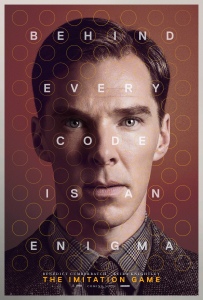 No one goes into making a movie trying to make an “Oscar movie”, which with eight nominations and Best Picture frontrunner status, “The Imitation Game” has easily been for some time. But a director will go into a film trying to convey a person’s importance. Those fawning biopic qualities of genius in Morten Tyldum’s film overshadow the crafty genre picture of numbers and intellect waiting to be decoded.
No one goes into making a movie trying to make an “Oscar movie”, which with eight nominations and Best Picture frontrunner status, “The Imitation Game” has easily been for some time. But a director will go into a film trying to convey a person’s importance. Those fawning biopic qualities of genius in Morten Tyldum’s film overshadow the crafty genre picture of numbers and intellect waiting to be decoded.
“The Imitation Game” depicts the life work of Alan Turing (Benedict Cumberbatch), a British mathematician who invented a machine designed to break the Nazi code Enigma during World War II. Thousands of messages were sent via this decryption machine during wartime, crippling Allied intelligence in the process. The machine was so sophisticated that it was thought unbreakable.
When Stewart Menzies (Mark Strong) conveys to Turing the stakes of not being able to crack this code, “The Imitation Game” shines. “Do you know how many people have died at the hands of Enigma? Three. While we’ve been having this conversation.” He gives Turing the impossible odds, and Tyldum appeals to the audience’s gamesmanship. It’s a riddle, and by explaining how code breaking works and how Turing learned to decipher codes as a child, we feel a little smarter watching it.
In something like “A Beautiful Mind”, that was almost enough. The logic behind John Nash’s theories and cryptography made for compelling filmmaking. But Tyldum tries to tie all of Turing’s number crunching into work befitting Mozart or Steve Jobs. “Think of it as an Electrical Brain. A Digital Computer,” he explains in laymen’s terms and putting the careful emphasis on “computer” to his colleague and sort of love interest Joan Clarke (Keira Knightley). You see, not only did Turing single handedly win World War II by breaking an unbreakable Nazi code, but he also single handedly invented the one tool that defines every aspect of modern society. Isn’t he great?
Most traditional biopics have only determined two personality types for people of unspeakable genius: the overconfident and smug visionary or the awkward, anti-social nerd. Both end up being assholes in one way or another. Much like Russell Crowe’s work as John Nash, Cumberbatch’s performance places him into the latter category, sputtering through dialogue, looking fervently at his shoes, avoiding eye contact, missing social cues and acting generally blunt, deadpan and slyly witty.
It’s admirable work, and Cumberbatch’s chemistry with Knightley brings out the film’s understated social politics. She was forced to work in secret on Turing’s team because it was deemed inappropriate for a woman to be in the company of men on the job, and he was forced to mask his homosexuality, two details that give the film an added layer of dramatic tension.
Beyond that, “The Imitation Game” somewhat lacks in creating real drama. Cooped up inside offices and missing any war footage, the stakes aren’t truly obvious for Turing and his team until late in the film when they finally crack one, torn between how this new intelligence and their new power can shape the war. Tyldum then amps up the personal melodrama of Turing’s childhood and the “importance of what he’s doing here” in a way that screams prestige.
As a British period drama about a genius, “The Imitation Game” has perhaps wrongly been compared to “The Theory of Everything.” But Tyldum’s film views his genius with more depth than James Marsh does, and even if in the grand scheme of history Turing is less important than Stephen Hawking, he puts enough weight and excitement into the film to convince otherwise.
3 stars